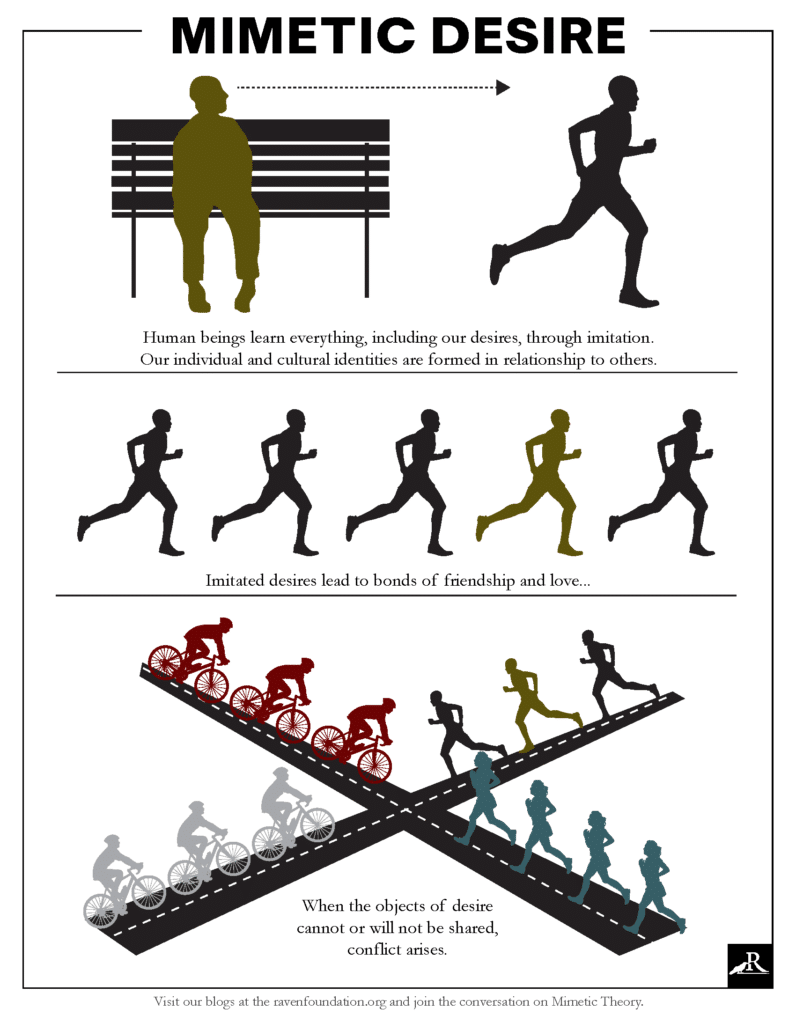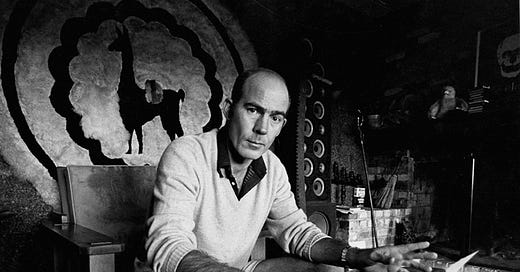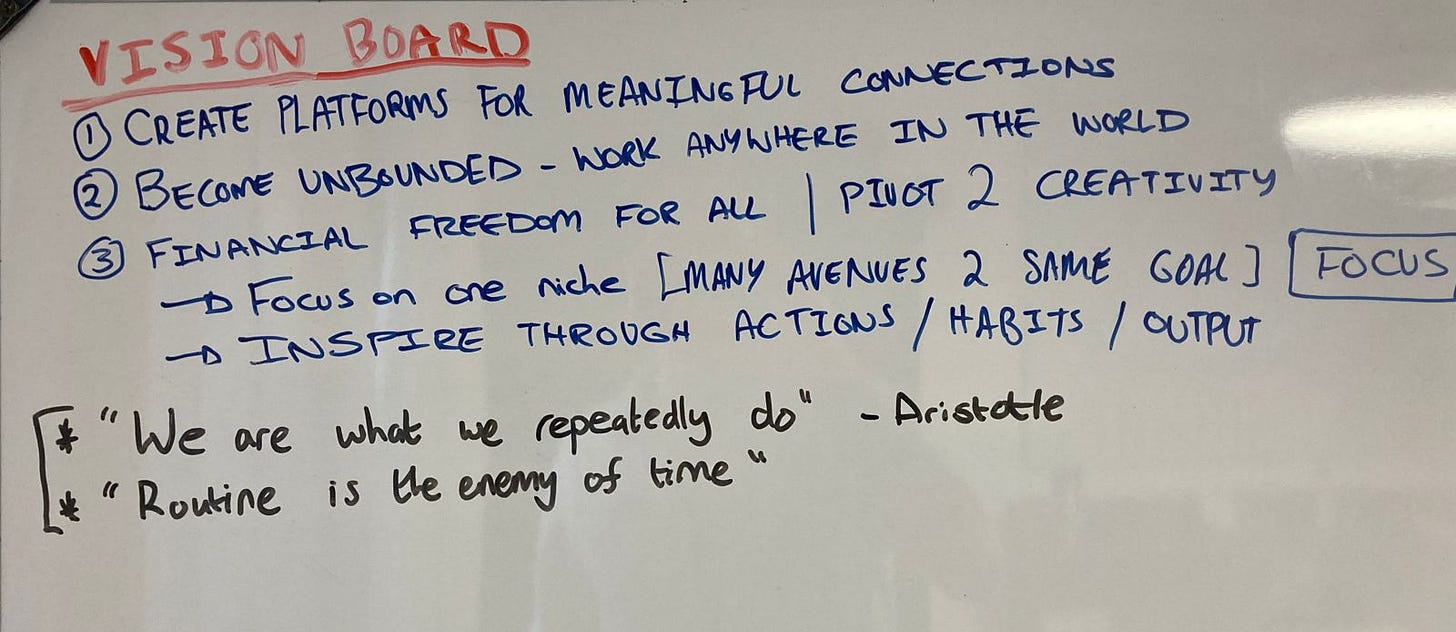In April 1958, Hunter S Thompson (22 years old) wrote a letter to his friend in response to a request for life advice.
This letter, found in Letters of Note, contains some of the best life advice I have ever come across and reads beautifully with Thompson’s quirky writing style.
April 22, 1958
57 Perry Street
New York CityDear Hume,
You ask advice: ah, what a very human and very dangerous thing to do! For to give advice to a man who asks what to do with his life implies something very close to egomania. To presume to point a man to the right and ultimate goal— to point with a trembling finger in the RIGHT direction is something only a fool would take upon himself.
I am not a fool, but I respect your sincerity in asking my advice. I ask you though, in listening to what I say, to remember that all advice can only be a product of the man who gives it. What is truth to one may be disaster to another. I do not see life through your eyes, nor you through mine. If I were to attempt to give you specific advice, it would be too much like the blind leading the blind.
“To be, or not to be: that is the question: Whether ’tis nobler in the mind to suffer the slings and arrows of outrageous fortune, or to take arms against a sea of troubles … ” (Shakespeare)
And indeed, that IS the question: whether to float with the tide, or to swim for a goal. It is a choice we must all make consciously or unconsciously at one time in our lives. So few people understand this! Think of any decision you’ve ever made which had a bearing on your future: I may be wrong, but I don’t see how it could have been anything but a choice however indirect— between the two things I’ve mentioned: the floating or the swimming.
But why not float if you have no goal? That is another question. It is unquestionably better to enjoy the floating than to swim in uncertainty. So how does a man find a goal? Not a castle in the stars, but a real and tangible thing. How can a man be sure he’s not after the “big rock candy mountain,” the enticing sugar-candy goal that has little taste and no substance?
The answer— and, in a sense, the tragedy of life— is that we seek to understand the goal and not the man. We set up a goal which demands of us certain things: and we do these things. We adjust to the demands of a concept which CANNOT be valid. When you were young, let us say that you wanted to be a fireman. I feel reasonably safe in saying that you no longer want to be a fireman. Why? Because your perspective has changed. It’s not the fireman who has changed, but you. Every man is the sum total of his reactions to experience. As your experiences differ and multiply, you become a different man, and hence your perspective changes. This goes on and on. Every reaction is a learning process; every significant experience alters your perspective.
So it would seem foolish, would it not, to adjust our lives to the demands of a goal we see from a different angle every day? How could we ever hope to accomplish anything other than galloping neurosis?
The answer, then, must not deal with goals at all, or not with tangible goals, anyway. It would take reams of paper to develop this subject to fulfillment. God only knows how many books have been written on “the meaning of man” and that sort of thing, and god only knows how many people have pondered the subject. (I use the term “god only knows” purely as an expression.) There’s very little sense in my trying to give it up to you in the proverbial nutshell, because I’m the first to admit my absolute lack of qualifications for reducing the meaning of life to one or two paragraphs.
I’m going to steer clear of the word “existentialism,” but you might keep it in mind as a key of sorts. You might also try something called Being and Nothingness by Jean-Paul Sartre, and another little thing called Existentialism: From Dostoyevsky to Sartre. These are merely suggestions. If you’re genuinely satisfied with what you are and what you’re doing, then give those books a wide berth. (Let sleeping dogs lie.) But back to the answer. As I said, to put our faith in tangible goals would seem to be, at best, unwise. So we do not strive to be firemen, we do not strive to be bankers, nor policemen, nor doctors. WE STRIVE TO BE OURSELVES.
But don’t misunderstand me. I don’t mean that we can’t BE firemen, bankers, or doctors— but that we must make the goal conform to the individual, rather than make the individual conform to the goal. In every man, heredity and environment have combined to produce a creature of certain abilities and desires— including a deeply ingrained need to function in such a way that his life will be MEANINGFUL. A man has to BE something; he has to matter.
As I see it then, the formula runs something like this: a man must choose a path which will let his ABILITIES function at maximum efficiency toward the gratification of his DESIRES. In doing this, he is fulfilling a need (giving himself identity by functioning in a set pattern toward a set goal), he avoids frustrating his potential (choosing a path which puts no limit on his self-development), and he avoids the terror of seeing his goal wilt or lose its charm as he draws closer to it (rather than bending himself to meet the demands of that which he seeks, he has bent his goal to conform to his own abilities and desires).
In short, he has not dedicated his life to reaching a pre-defined goal, but he has rather chosen a way of life he KNOWS he will enjoy. The goal is absolutely secondary: it is the functioning toward the goal which is important. And it seems almost ridiculous to say that a man MUST function in a pattern of his own choosing; for to let another man define your own goals is to give up one of the most meaningful aspects of life— the definitive act of will which makes a man an individual.
Let’s assume that you think you have a choice of eight paths to follow (all pre-defined paths, of course). And let’s assume that you can’t see any real purpose in any of the eight. THEN— and here is the essence of all I’ve said— you MUST FIND A NINTH PATH.
Naturally, it isn’t as easy as it sounds. You’ve lived a relatively narrow life, a vertical rather than a horizontal existence. So it isn’t any too difficult to understand why you seem to feel the way you do. But a man who procrastinates in his CHOOSING will inevitably have his choice made for him by circumstance.
So if you now number yourself among the disenchanted, then you have no choice but to accept things as they are, or to seriously seek something else. But beware of looking for goals: look for a way of life. Decide how you want to live and then see what you can do to make a living WITHIN that way of life. But you say, “I don’t know where to look; I don’t know what to look for.”
And there’s the crux. Is it worth giving up what I have to look for something better? I don’t know— is it? Who can make that decision but you? But even by DECIDING TO LOOK, you go a long way toward making the choice.
If I don’t call this to a halt, I’m going to find myself writing a book. I hope it’s not as confusing as it looks at first glance. Keep in mind, of course, that this is MY WAY of looking at things. I happen to think that it’s pretty generally applicable, but you may not. Each of us has to create our own credo— this merely happens to be mine.
If any part of it doesn’t seem to make sense, by all means call it to my attention. I’m not trying to send you out “on the road” in search of Valhalla, but merely pointing out that it is not necessary to accept the choices handed down to you by life as you know it. There is more to it than that— no one HAS to do something he doesn’t want to do for the rest of his life. But then again, if that’s what you wind up doing, by all means convince yourself that you HAD to do it. You’ll have lots of company.
And that’s it for now. Until I hear from you again, I remain,
your friend,
Hunter
In the rest of this article, I share my takeaways and their relevance in today’s world.
Takeaways and Reflection
1. Be Cautious about seeking and giving life advice
I've come to realize that constantly seeking advice can be counterproductive. I've spent hours asking others for their top career advice, the habits they followed to achieve success, and the secrets that transformed their thinking.
I've found it more helpful to listen and read about people's experiences, understanding the intricacies of the hero's journey they undertook to conquer their challenges. These stories have inspired me to face my own battles and learn valuable lessons through retrospective reflection on my experiences. As Thompson says, “What is truth to one may be disaster to another.”

2. Goals can be misleading: Embrace a way of life instead
As Malcolm Gladwell’s Outliers suggest, circumstances and luck play significant roles in one's financial and vocational success. Recognizing this helps us understand what is beyond our control and what is within our grasp.
Thompson encourages us to focus on the areas we can control by adopting a way of life that maximizes the efficiency of our abilities and desires, instead of pursuing specific, tangible goals.
I've created a vision board reflecting this approach. It remains non-specific yet enables me to optimize meaning, abilities, and desires in my life.
Although setting goals like "Have a net worth of $5 million dollars at the age of 30" and planning the steps to achieve them isn't inherently wrong, embracing a way of life provides the flexibility to adapt to our ever-changing environments.
3. Forge Your Own Life Path & Overcome Mimetic Desire
The rise of short-form video content on platforms like TikTok, Instagram, and YouTube has created new opportunities for people to showcase their unique personalities and monetize them. For instance, videos featuring street photographers, lawnmowers, and train enthusiasts have amassed millions of views. One example is "The Train Guy," whose engaging personality has earned him a dedicated following. A YouTube commenter noted, "The only thing better than the camera angle is his personality." This statement captures the essence of these new creative careers, where people are monetizing their unique personalities, despite the unconventional nature of their content.
Such opportunities highlight the importance of Thompson's advice about not letting others define our goals or life paths. In the past, no teacher would have suggested that a student could make a comfortable living by reacting to trains passing by. Yet, today, embracing our distinctive perspectives and experiences allows us to chart our own course and maintain our individuality.
However, it is essential to be mindful of the role mimetic desire plays in today's society. Mimetic desire leads us to compare ourselves to others, including celebrities and role models, fueling our longing for material possessions and status symbols. In doing so, we often forget that these individuals experience suffering too and are not infallible gods.
To counteract the negative aspects of mimetic desire, we should cultivate habits of self-reflection and meditation, allowing us to focus on our unique strengths and aspirations. By limiting our social comparisons and nurturing our individuality, we can create our own life paths and fully embrace our authentic selves.

Conclusion
Hunter S. Thompson's timeless advice from his 1958 letter remains relevant and insightful even in today's rapidly changing world. By embracing our unique individuality, focusing on a meaningful way of life rather than specific goals, and cultivating habits of self-reflection to overcome mimetic desire, we can forge our own life paths. Let Thompson's wisdom be a guiding light to curiously navigate the complexities of life, never allowing the limiting beliefs of others to stop us from seeking our unique ways of living a meaningful life.







Insightful and well written. One truly needs to be brave to embrace a meaningful life.